
Non-timber Forest Products and Food Security
Conserve forest more to secure food sustainably!
Versandkostenfrei!
Versandfertig in 6-10 Tagen
36,99 €
inkl. MwSt.

PAYBACK Punkte
18 °P sammeln!
Livelihoods of the rural people of Ethiopia depend on agriculture. However, erratic nature of rain and prevalence of drought in the country make agricultural production a challenge. To counter this problem, use of the available forest resource for non-timber forest products production is the most promising option. Nevertheless, no systematic and rigorous analysis on contribution of the product to income and food security to households was made. This study, therefore, was conducted in the Yabello Woreda of Borana Zone, with the objectives of identifying determinants of household food security i...
Livelihoods of the rural people of Ethiopia depend on agriculture. However, erratic nature of rain and prevalence of drought in the country make agricultural production a challenge. To counter this problem, use of the available forest resource for non-timber forest products production is the most promising option. Nevertheless, no systematic and rigorous analysis on contribution of the product to income and food security to households was made. This study, therefore, was conducted in the Yabello Woreda of Borana Zone, with the objectives of identifying determinants of household food security in the study area, to assess contribution of non-timber forest products to household food security, and to analyze the challenges in getting contribution from non-timber forest products to the rural household food security. The required data set for the study were gathered primarily through survey method from 160 randomly selected sample households both from non-timber forest products participants and non-participants (80 each). A purposive sampling procedure was used to select 2 PAs. Structured interview was used as data collection method. Supplementary, secondary data were collected from vari












